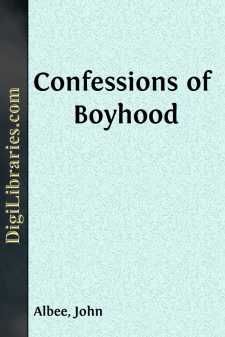Categories
- Antiques & Collectibles 13
- Architecture 36
- Art 48
- Bibles 22
- Biography & Autobiography 813
- Body, Mind & Spirit 142
- Business & Economics 28
- Children's Books 17
- Children's Fiction 14
- Computers 4
- Cooking 94
- Crafts & Hobbies 4
- Drama 346
- Education 46
- Family & Relationships 57
- Fiction 11829
- Games 19
- Gardening 17
- Health & Fitness 34
- History 1377
- House & Home 1
- Humor 147
- Juvenile Fiction 1873
- Juvenile Nonfiction 202
- Language Arts & Disciplines 88
- Law 16
- Literary Collections 686
- Literary Criticism 179
- Mathematics 13
- Medical 41
- Music 40
- Nature 179
- Non-Classifiable 1768
- Performing Arts 7
- Periodicals 1453
- Philosophy 64
- Photography 2
- Poetry 896
- Political Science 203
- Psychology 42
- Reference 154
- Religion 513
- Science 126
- Self-Help 84
- Social Science 81
- Sports & Recreation 34
- Study Aids 3
- Technology & Engineering 59
- Transportation 23
- Travel 463
- True Crime 29
Confessions of Boyhood
by: John Albee
Categories:
Description:
Excerpt
For so many years Bellingham has had its abode in my fancy that I find it hard to associate the town with a definite geographical location. I connect it rather with the places of dreams and wonderland; the lost cities of the Oxus and Hydaspes, the Hesperian Gardens and those visionary realms visited and named by poets. My birthplace grows unfamiliar when I take down an atlas and run my finger over the parti-colored divisions of the Norfolk County of Massachusetts and trace the perimeter which confines Bellingham to its oblong precinct, surrounded by those mythical lands of Mendon, Milford and Medway. They wear an authoritative appearance on the map; but for me they occupied no such positions in my childhood and stand as stubborn realities hindering my feet when I wish to return to the Red House of my fathers. Once there, memory and fact are no longer conflicting. I find, as of old, the gently undulating hills, the gently loitering stream.
The legends concerning the founding of Bellingham are missing. I am sorry; for I could believe the most extravagant, feeling with Plutarch, that fortune, in the history of any town, often shows herself a poet. The Delphian Pythoness advised Theseus to found a city wherever in a strange land he was most sorrowful and afflicted. There at length he would find repose and happiness. Thus it happened when the wanderers from Braintree settled on the shores of the upper Charles. They brought their unhappy fortunes so far, and there, in due time, found comfort and contentment.
The traveller, journeying through the highways of Bellingham, would see nothing to attract his attention or interest. It has no monuments, ruins nor historic associations; no mountain, nor hill even. The Charles river has travelled so little way from its source as hardly yet to be a river. The soil is stony and pays back not much more than is put into it. The fine forests of white oak have been mostly reduced to ashes in the stoves of Milford, and their oracles have ceased. My father, who could cut as clean a scarf as any man of his day, helped to fell them. Scrub oak and gray birch have taken their places, but do not fill them. One great elm remains; it seemed to me the largest and oldest tree in the world. My mother nursed her children in its shade; under it my world began. In its top lived the wind and from the longest spray of its longest limb the oriole hung her artistic basket and brooded her golden babies. Like many another ancient dooryard tree it carried back its traditional origin to a staff stuck in the ground and left to its fate.
Bellingham was incorporated in 1719 by yeoman farmers, and later settled largely by Revolutionary soldiers from neighboring communities on the east, particularly from old Braintree. On the Mendon tablet placed in memory of the founders of the town appears the name of my earliest ancestor. He was a surveyor and plotted the land and built the first mill, being called from Braintree for that purpose. Permit me to take pride in my learned ancestor, especially in his talent for figures—the distress of my life. The most interesting periods in the annals of the New England people are when they began to organize themselves into communities for the promotion of law, learning and piety. Their efforts were primitive yet affecting. Their language halted, but they knew what they wanted and meant to have.
Such are the records of Bellingham. And other history it has little out of the common incidents of humanity. No eminent sons have as yet remembered it with noble benefactions. It has had no poet and no mention in literature. The reporters pass it by. It is not even a suburb, last sad fate of many towns and villages. This is one of the reasons for my attachment—its unchangeableness, its entire satisfaction of sentiment.
Yet such is the charm of one's native soil that he is able to find in it the most wonderful of all the beautiful things of the soul, namely, those which no one else can see or believe....


